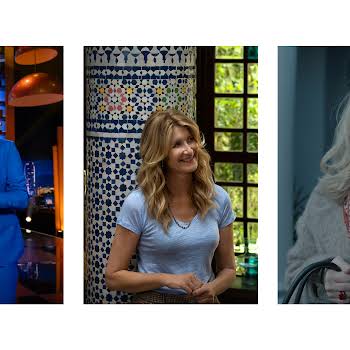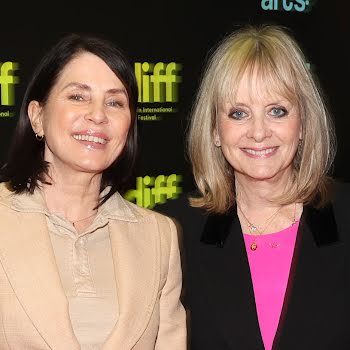Death of the rom-com or rom-com renaissance? Julia Roberts has a one-way ticket to paradise
By Sarah Finnan
24th Feb 2023
24th Feb 2023
Once considered in vogue, rom-coms went from abundant to almost non-existent in recent years, but with Julia Roberts, Emma Thompson and Lily James now ushering in a new wave of romanticism, it seems that true love might prevail after all.
I’ve always considered myself a ‘secret romantic’, but one look at my list of favourite movies will tell you there’s nothing secret about it.
From Casablanca to You’ve Got Mail, Notting Hill and 10 Things I Hate About You, I’ve spent years subsisting on a diet of meet-cutes and musical numbers. Humphrey Bogart and Heath Ledger set the standard and I’ve grown up believing that true love (albeit a slightly unrealistic, neatly-packaged, Hollywood version) does exist.
The golden age of rom-coms
The noughties were a simpler time and my adolescence was soundtracked by dial-up connection and Kate Hudson scolding Matthew McConaughey for letting their love fern die. You see, dear reader, my teenage years coincided with the golden age of rom-coms (that’s romantic comedies to the uncultured amongst you) and I leaned into the genre, hard.
Advertisement
Then, somewhat of a drought occurred. The once overflowing pool of titles quickly dried up and I was forced to watch the same cult classics on rotation. The Notebook on Monday, When Harry Met Sally on Tuesday, Pretty Woman on Wednesday… A few modern offerings slipped through the cracks – The Proposal, The Other Woman, Set It Up, The Big Sick – but for the most part, it seemed that the humble rom-com had very much died a death.
During the genre’s heyday, legacy studios were churning out romantic comedies quicker than Hugh Grant could tousle his floppy hair. Grand gestures were Hollywood’s currency du jour and such films were indomitable at the box office. My Big Fat Greek Wedding, the highest-grossing American rom-com ever, made 75 times its production budget at the box office. Modern rom-coms have been vastly less successful though – which can probably be attributed to myriad factors. Their predictability, for one.
Same old, same old
Rom-coms are nothing if not predictable, they generally all follow the same trajectory; conventionally attractive white boy has awkward meet-cute with conventionally attractive white girl, something bad happens, something good happens, happily ever after. In recent years, audiences have tired of the same tried and tested formula.
There has also been increased demand for on-screen diversity, which Hollywood is slowly (very slowly) listening to and movies such as Crazy Rich Asians, To All The Boys I’ve Loved Before and The Big Sick have endeared themselves to audiences bored of the otherwise same old, same old. The latter not only made over 11 times its $5 million budget, it also racked up a slew of prestigious nominations come awards season – including an Oscar nomination for Best Original Screenplay.
Parade.com reports that Love, Simon, the first studio rom-com about a gay teen, generated $66 million in worldwide grosses on a budget well under $20 million. “There’s an opportunity for stories to be told with films that represent more than just a white woman, a white man, and their meet-cute,” Kimber Myers, a critic for The Los Angeles Times, Crooked Marquee and other outlets told the website.
“There’s also something to be said for having more women (especially women of colour) as directors and screenwriters. Women are still the primary audience for these movies, and we don’t want to see movies filled with characters who don’t behave like any women we’ve ever met,” Myers added. As many have already pointed out, the survival of the rom-com depends on stories expanding to include all different types of modern love.
Advertisement
Money matters
There’s also the small issue of profit. Money matters in Hollywood which means that producers have prioritised big-budget blockbusters and Oscar winners over mid-budget rom-coms. “Once superhero movies really became the only movie studios cared about, the experience of making a movie like mine changed. I remember when I finished The Intern, I thought, ‘I think this is it’,” Nancy Meyers (Something’s Gotta Give, The Holiday) once told Vulture.
Scott Meslow, culture writer and author of From Hollywood With Love: The Rise and Fall (And Rise Again) of the Romantic Comedy, agrees. “Romantic comedies largely disappeared at the studios for the same reason most mid-budget movies started to disappear: Hollywood favoured… massive blockbusters or traditional awards fare, with very little happening between those two poles.
“I do think rom-coms were uniquely disadvantaged by this trend, because they [also] don’t tend to draw the kind of awards attention that can make a studio less nervous to greenlight, say, a mid-budget drama,” he continued.
Changing times
Which speaks to another point; the categorisation of rom-coms as “chick flicks” and the – most often negative – associations that come with that. Over the years, many filmmakers have chosen to boycott the genre altogether, pursuing more “respectable” films in the hopes of being “taken seriously” in the industry. Modern actors have also made a conscious effort to eschew the rom-com label, perhaps warded off by the likes of Katherine Heigl, Kate Hudson and Jennifer Aniston who found themselves pigeonholed by their own success.
Even Hollywood heavyweight Sandra Bullock, who starred in the recently-released The Lost City alongside Channing Tatum, intentionally distanced herself from the genre for more than a decade. “I started noticing that anytime someone was talking about that type of film, when they would say the word ‘chick flick’, there was an ugly look on their face, and I took offence because I was a chick,” she told The Wall Street Journal. “All of a sudden, rom-com was in air quotes with that ugly stink face.” What changed? “The beauty of the last five years is that movies with romance and love and humour and pathos are now reflecting our community,” she noted.
There have been many (many!) bad rom-coms in recent years and much fewer good ones… which certainly hasn’t helped the genre’s longevity. New-wave feminism and the proliferation of the #MeToo movement have also had a knock-on effect on their popularity. As has the introduction of streaming services such as Netflix, Disney+ and Amazon Prime. People, it seems, are much more likely to stick a rom-com on at home in their pyjamas, than trek to the cinema to watch it over a bucket of overpriced popcorn. Younger audiences have different viewing habits than previous generations and Hollywood knows this.
Advertisement
Rom-com renaissance
That said, last year marked the start of a rom-com renaissance of sorts, with several new releases foraying back into familiar territory. None of these new offerings stray too far from the norm – there is still a certain formulaic consistency to how the plot plays out – but the appetite for cheese has returned.
Malin Akerman, herself a stalwart in the genre who has appeared in films such as 27 Dresses, The Proposal and Couples Retreat, believes the current global landscape is to thank for this resurgence. “Coming out of the two years we’ve been in, I think people need a bit more lightheartedness,” she told Parade.com. “We need some escapism, joy, and love and romance – human connection has been really lost for the past couple years, I can understand why [studios] are investing in that.”
Last February, Universal released Marry Me over the Valentine’s Day weekend. Fresh, a dark twist on the traditional tropes of the genre, debuted on Disney+ not long after, and a couple of months after that, Ticket To Paradise with Julia Roberts and George Clooney had its nationwide premiere. Roberts hadn’t starred in a rom-com for close to two decades, so surely, that was a sign that the genre is back to its former glory… or some semblance of it, at least?
Of her 20-year absence, Roberts told The New York Times, “People sometimes misconstrue the amount of time that’s gone by as me not wanting to do [a rom-com]. If I had read something that I thought was that Notting Hill level of writing or My Best Friend’s Wedding level of madcap fun, I would do it. They didn’t exist until this movie.”
Nothing about Ticket To Paradise is surprising; it ends just as you think it will and you can see it coming from the moment the film starts rolling (even before, perhaps). What was surprising though, was the reception. Granted, the cinema was full of people who actually like rom-coms, but there were audible “oohs”, “aahs” and many guffaws throughout, which was refreshing to a hopeless romantic such as myself. Modern life encourages cynicism, so it was nice to be surrounded by dreamers if even just briefly.
If rom-coms are your thing, there’s yet another to look forward to this week – What’s Love Got to Do with it? starring Lily James, Shazad Latif and Emma Thompson. Catch it in cinemas nationwide from Friday, February 24.
Advertisement























